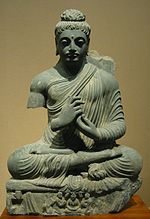direct analysis of Buddhist metaphysics through the lens of determinism is difficult, due to the differences between European and Buddhist traditions of thought... 22 KB (2,674 words) - 16:14, 19 April 2024 |
 | Repetti, Ricardo (2012). "Buddhist Hard Determinism: No Self, No Free Will, No Responsibility" (PDF). Journal of Buddhist Ethics. 19: 136–137, 143–145... 85 KB (10,635 words) - 15:11, 8 April 2024 |
 | Mahayana (redirect from Mahayana Buddhist) Another influential tradition is that of Dignāga's Buddhist logic whose work focused on epistemology. He produced the Pramānasamuccaya, and later Dharmakirti... 146 KB (17,129 words) - 08:27, 27 March 2024 |
 | Śūnyatā (redirect from The Buddhist Concept of Emptiness) who argued for the use of logical arguments using the pramana-based epistemology of Indian logicians like Dignāga. Bhāvaviveka argued that Madhyamika's... 85 KB (10,196 words) - 16:17, 4 March 2024 |
 | Madhyamaka (section Early Buddhist Texts) svabhāva doctrine"), refers to a tradition of Buddhist philosophy and practice founded by the Indian Buddhist monk and philosopher Nāgārjuna (c. 150 – c... 141 KB (17,675 words) - 03:28, 4 February 2024 |
Anattā (category Buddhist philosophical concepts) understanding of the Buddhist concept of anattā. Ahamkara Anicca Asceticism Atman (Buddhism) Atman (Hinduism) Buddhist logico-epistemology Catuṣkoṭi Dukkha... 85 KB (9,107 words) - 17:35, 20 April 2024 |
 | Yogachara (redirect from Buddhist idealism) during the so called middle period are: A logico-epistemic tradition (pramāṇavāda) focusing on issues of epistemology (Sanskrit: pramāṇa) and logic (hetuvidyā)... 149 KB (18,225 words) - 02:06, 13 April 2024 |
 | Vaibhāṣika (category Early Buddhist schools) सर्वास्तिवाद-वैभाषिक) or simply Vaibhāṣika (वैभाषिक) is an ancient Buddhist tradition of Abhidharma (scholastic Buddhist philosophy), which was very influential in north... 90 KB (12,764 words) - 17:20, 2 April 2024 |
Two truths doctrine (category Buddhist philosophical concepts) Chattopadhyaya 2001, p. 21-3,94,104. S.R. Bhatt & Anu Meherotra (1967). Buddhist Epistemology. p. 7. Debiprasad Chattopadhyaya (2001). What is Living and What... 45 KB (5,528 words) - 06:18, 23 November 2023 |
Abhidharma (redirect from Buddhist Abhidharma) The Abhidharma are a group of Buddhist texts dating from the 3rd century BCE onwards, which contain detailed scholastic presentations of doctrinal material... 79 KB (9,939 words) - 20:05, 21 April 2024 |
Sautrāntika (category Early Buddhist schools) bù\ shuō jīng bù; Japanese: 経量部, romanized: Kyou Ryou Bu) were an early Buddhist school generally believed to be descended from the Sthavira nikāya by way... 11 KB (1,258 words) - 14:56, 23 September 2023 |
 | Sarvastivada (category Early Buddhist schools) Japanese: せついっさいうぶ; Korean: 설일체유부;Thai: สรวาสติวาท) was one of the early Buddhist schools established around the reign of Ashoka (third century BCE). It... 35 KB (4,187 words) - 20:27, 21 April 2024 |
 | Pudgalavada (category Early Buddhist schools) 補特伽羅論者; pinyin: Bǔtèjiāluō Lùnzhě) was a Buddhist philosophical view and also refers to a group of Nikaya Buddhist schools (mainly known as Vātsīputrīyas)... 27 KB (3,739 words) - 03:25, 27 September 2023 |
 | Nagarjuna (category 2nd-century Buddhist monks) Mahāyāna Buddhist philosopher monk of the Madhyamaka (Centrism, Middle Way) school. He is widely considered one of the most important Buddhist philosophers... 46 KB (5,396 words) - 07:09, 13 April 2024 |
 | Theravāda Abhidhamma (category Theravada Buddhist texts) systematization of the Theravāda school's understanding of the highest Buddhist teachings (Abhidhamma). These teachings are traditionally believed to have... 69 KB (9,302 words) - 03:10, 2 July 2023 |
 | Chandrakirti (category 7th-century Buddhist monks) an opponent's positions, (2) rejection of the key tenets of the Buddhist epistemology initiated by Dignaga and developed further by Dharmakirti, (3) a... 38 KB (4,680 words) - 08:24, 12 April 2024 |
 | Śāntarakṣita (category Indian Buddhist monks) first Buddhist monastery in Tibet. Śāntarakṣita defended a synthetic philosophy which combined Madhyamaka, Yogācāra and the logico-epistemology of Dharmakirti... 28 KB (3,374 words) - 00:34, 11 April 2024 |
 | Empiricism (redirect from Empiricist epistemology) and empirical evidence. It is one of several competing views within epistemology, along with rationalism and skepticism. Empiricists argue that empiricism... 51 KB (6,644 words) - 16:30, 15 April 2024 |
 | Pragmatism (section Theory of truth and epistemology) a Logical Point of View: Logico-Philosophical Essays. pp. 20–46. Quine, W. V. (1980). From a Logical Point of View: Logico-Philosophical Essays (2nd ed... 88 KB (10,136 words) - 00:51, 22 April 2024 |
Prajñakaragupta (category Buddhist logic) the existence of other minds. Retrocausality Idealism Buddhist logico-epistemology Epistemology Franco, Eli, “Prajñākaragupta”, in: Brill's Encyclopedia... 36 KB (4,758 words) - 18:25, 25 March 2024 |
Jitāri (category Buddhist logic) Aparamitayus. Prajñakaragupta Retrocausality Idealism Buddhist logico-epistemology Epistemology Chu, Junjie, and Eli Franco. 2016. “Rare Manuscripts of... 10 KB (1,093 words) - 06:45, 20 March 2024 |
 | Stoicism (section Epistemology) Philosophical Language (1668) Alciphron (1732) "On Denoting" (1905) Tractatus Logico-Philosophicus (1921) Language, Truth, and Logic (1936) Two Dogmas of Empiricism... 50 KB (5,777 words) - 01:01, 22 April 2024 |
Apoha (category Epistemology) Dignāga's successor Dharmakīrti (6th or 7th century CE). Buddhist philosophers of the logico-epistemological school, of which Dignāga and Dharmakīrti... 13 KB (1,728 words) - 12:41, 28 January 2024 |
"linguistic turn". These writers were followed by Ludwig Wittgenstein (Tractatus Logico-Philosophicus), the Vienna Circle, logical positivists, and Willard Van... 66 KB (8,526 words) - 21:34, 17 April 2024 |





